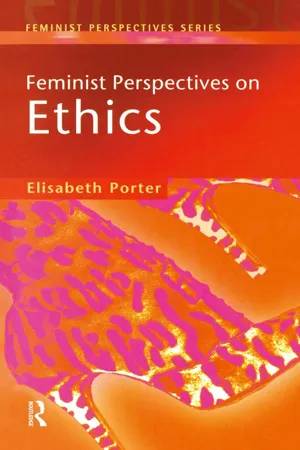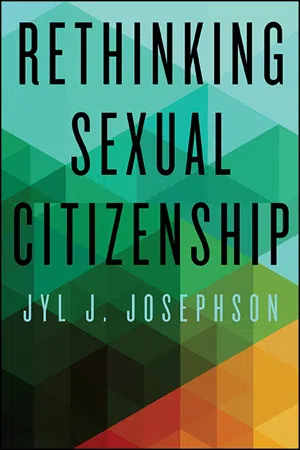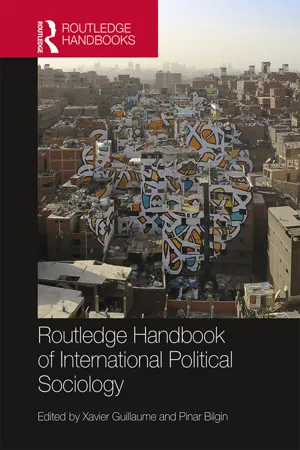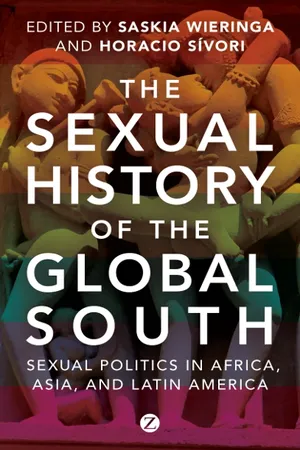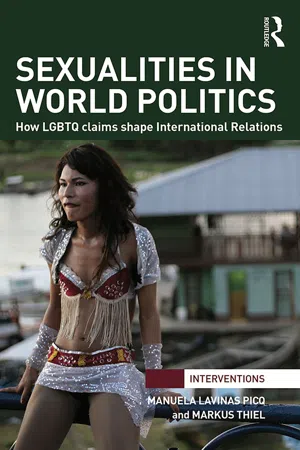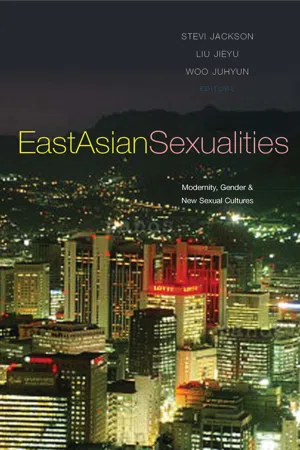Politics & International Relations
Sexual Politics
Sexual politics refers to the ways in which power dynamics, social norms, and institutions intersect with sexuality and gender. It encompasses the political struggles for sexual and reproductive rights, gender equality, and LGBTQ+ rights. This field of study examines how political systems and policies impact individuals' sexual identities, behaviors, and relationships.
Written by Perlego with AI-assistance
Related key terms
7 Key excerpts on "Sexual Politics"
- eBook - ePub
- Elizabeth Porter(Author)
- 2014(Publication Date)
- Routledge(Publisher)
Given this variation, the controversies on sexuality within feminism are lively (Soble 1997). However, there are a number of agreements, namely that Sexual Politics is about unequal power relations; sexuality is a crucial part of our embodiment; treating anyone as if they are nothing but a sex object is wrong. This is not a chapter on sexuality, but on Sexual Politics. Feminist ethics is concerned with how unequal power relations undermine the moral integrity of persons. To accommodate diversity and resist abstract constructions of otherness, feminist ethics deconstructs dualisms like sex/gender, nature/culture, domination/submission and hetero/homosexuality. Sexuality is not purely natural, biological or instinctual, but is profoundly affected by cultural interpretations, socialization into gendered positions of masculinity and femininity and the power relations that correspond to these positions. The boundaries between sex and gender are blurred. Theorists like Susan Bordo (1993) and Moria Gatens (1996) elucidate the neglect of the body as a product of dualistic thought that divides human experience into body and mind. ‘The female body becomes a metaphor for the corporeal pole of this dualism, representing nature, emotionality, irrationality and sensuality. Images of the dangerous, appetitive female body, ruled precariously by her emotions, stand in contrast to the masterful, masculine will, the locus of social power, rationality and self-control’ (Davis 1997: 5). Sexual Politics What are ‘sexual polities’? Aristotle’s view is that relations are political when one rules and another is ruled, when relations are grounded on inequalities of power and status. Aristotle believed that one demonstration of a man’s courage is his command over a woman, whose courage is exhibited in her obedience. In 1969, Kate Millett’s Sexual Politics explained how women are subordinated by control of their sexuality - eBook - ePub
- Jyl J. Josephson(Author)
- 2016(Publication Date)
- SUNY Press(Publisher)
Because I believe that we need more encompassing ways to look at these questions that take into account intersectional identities and the multiple ways that citizenship has been inegalitarian, I propose to use the framework of sexual citizenship. This approach does not solve all analytic problems, but for the policies that I am addressing it seems the most useful approach. In part, what this does is recognize that what has traditionally been seen as the separate public and private spheres are deeply intertwined and that there are many complicated relationships between public and intimate life. 19 Political Power is the Basis of Inequalities in Intimate and Public Life One of the important contributions of feminist political thought has been to make the point that decisions about how families, intimate life, and sexuality are intertwined with public life are made based on political power. This has been important because inequalities based on race, ethnicity, gender, and sexual orientation are often justified as natural. Thus, we see frequent references in defense of traditional understandings of gender, intimate life, and sexuality to nature, god, millennia of human practice, and so on. A very useful example of this is language used to discuss same-sex intimate relationships in the majority opinion in Bowers v. Hardwick (1986), mocking the very idea that there might be a “constitutional right to homosexual sodomy.” 20 This is very different from the respectful discussion in the majority opinion in Lawrence v. Texas (2003) - Xavier Guillaume, Pınar Bilgin, Xavier Guillaume, Pınar Bilgin(Authors)
- 2016(Publication Date)
- Routledge(Publisher)
The ways in which this simple, yet disruptive, insight manifests in contemporary feminist scholarship relates, for example, security measures implemented in airports in the name of ‘international security’ to the stability of a binary gender order (Shepherd and Sjoberg 2012; Redden and Terry 2013). Contemporary feminist research draws connections between social and context-specific idea(l)s about motherhood and assumptions about agency and political violence (Gentry 2009; Åhäll 2012); it establishes links between popular cultural representations of gender politics and foreign policy (Larson 2013; Zalewski 2013). The imbrication of everyday gender performances in practices of global politics renders visible the interconnections between the ‘international’, its politics and the kinds of sociological enquiry that permit nuanced and holistic understandings of its organization. Because “gender makes the world round” (Enloe 2000 [1989]: 1), these enquiries need at least to pay attention to gender as a category of analysis if they are not to overlook a significant dynamic that shapes and is in turn shaped by the way we live in the world.Relationality/emotionality
In her recasting of International Relations, Christine Sylvester argues instead for a focus on ‘relations international’. Such an approach, attentive to the relational aspects of international politics, “puts the emphasis directly on varieties of connection … across the lines, fences, wires, walls, imaginations, sound bites, politics, and immigration and customs guardhouses of the world” (Sylvester 1994: 219). This creative endeavour, which recognizes many more forms of power, authority, legitimacy and political activity than does a conventional narrow view of international relations as political practice, permits an understanding of ourselves as connected and connective entities and of politics as the site at which our mutual being in the world is negotiated.Encountering the international as a relational space and prioritizing the relational aspects of politics demands that we think differently about how to generate knowledge/understanding of that space and how to both apprehend and communicate that knowledge. Orienting ourselves as scholars in this way challenges the dominance of rationalism that has thus far characterized the study of global politics, as a ‘proper’ social science (Smith 2000: 383). This move had been labelled by some as an “aesthetic turn” (Bleiker 2001; see also the 2010 special issue of Global Society titled “Aesthetics and Global Politics”; Sylvester 2011a, 2011b), and by others as a move to embrace the emotionality of politics and its inherently social quality, which is a radical departure from the conventional guiding principles of the discipline of IR. It is only through exploring the relations, connections and emotions that constitute various, and variously well-researched, international social and political landscapes that we can hope to change disciplinary narratives (Marshall 2011: 690) and begin to tell different stories about our world. As Anna Agathangelou and L.H.M. Ling argue, storytelling creates “a space to critique and reconstruct our worlds by voicing, seeing understanding, and bridging the differential locations and subjectivities of selves and others [and] … helps us politicize social relations critically- eBook - ePub
The Sexual History of the Global South
Sexual Politics in Africa, Asia and Latin America
- Saskia Wieringa, Horacio Sívori(Authors)
- 2013(Publication Date)
- Zed Books(Publisher)
Ahmed 2005 ).In this introductory chapter we address two themes that cut across the empirical contributions in the various chapters: the interrogation of the colonialist gaze that has constituted sexuality and sexual subjects as an object of scientific inquiry, state repression, and bio-political intervention in the global South; and the conception of sexualities as an inherently localized phenomenon.Whose sexuality, whose gaze?If the meanings of sexuality and the production of sexual knowledge are part of a social process, it becomes important to interrogate its cultural and historic conditions, and locate the actors involved in that process. Colonialism, modernization, the Cold War, the surge of neoliberal policies over the past few decades, and the rise of new economic centers of power have a large impact on gender orders, bodily practices, and sexual subjectivities. National political and economic elites, religious leaders, international organizations such as WHO, UNAIDS, UN Women (formerly UNIFEM), and the World Bank, as well as Western and non-Western intellectuals and experts, have played a substantial role not only in shaping sexual subjectivities and regulating sexuality, but also in the classification of ‘sexual subcultures’ globally. The historical trajectory of studies of sexuality in the global South is also the history of a gaze constituted at the confluence of modern medical science and Western colonial expansion, which catalogued Southern perspectives on gender and the erotic as exotic innocent curiosities, at best, or degenerations at worst. - eBook - ePub
Sexualities in World Politics
How LGBTQ claims shape International Relations
- Manuela Lavinas Picq, Markus Thiel, Manuela Lavinas Picq, Markus Thiel(Authors)
- 2015(Publication Date)
- Routledge(Publisher)
1998 ) and other issues of Sexual Politics issues already. Gay and lesbian studies relate well to the subject of this volume and are political in nature, but very seldom take into account the broader trans- or international repercussions of LGBTQ politics.- While banning gay marriage and promoting traditional marriage at home, the administration of President Bush joined Egypt, Iran, and Pakistan in resisting any text mentioning stigmatized groups like men who have sex with men or sex workers from the Final Declaration of Commitments at the 2001 UN Special Session on HIV/AIDS.
Bibliography
- Ackerly B , Stern M , and True J (2006) Feminist Methodologies for International Relations . Cambridge: Cambridge University Press.
- Altman D (2001) Global Sex . Chicago: University of Chicago Press.
- Amar P (2013) The Security Archipelago: Human-Security States, Sexuality Politics, and the End of Neoliberalism . Durham, NC: Duke University Press.
- Beier M (2005) International Relations in Uncommon Places: Indigeneity, Cosmology, and the Limits of International Theory . Basingstoke: Palgrave Macmillan.
- Blasius M (2001) Sexual Identities, Queer Politics . Princeton, NJ: Princeton University Press.
- Browne K and Nash C (2010) Queer Methods and Methodologies . Farnham_ Ashgate.
- Brysk A Snow D A (2013) Human rights movements. In: Snow D A et al. (eds.) Wiley-Blackwell Encyclopedia of Social and Political Movements . Malden, MA: Wiley.
- Budhiraja S , Fried S , and Teixeira A Lind A (2010) Spelling it out. In: Lind A (ed.) Development, Sexual Rights and Global Governance . New York: Routledge.
- Comaroff J and Comaroff L (2012) Theory from the South: Or How Euro-America is Evolving Towards Africa . Boulder, CO: Paradigm Publishers.
- Corrêa S , Parker R , and Petchensky R (2008) Sexuality, Health and Human Rights
- eBook - ePub
East Asian Sexualities
Modernity, Gender and New Sexual Cultures
- Stevi Jackson, Jieyu Liu, Juhyun Woo, Stevi Jackson, Jieyu Liu, Juhyun Woo(Authors)
- 2013(Publication Date)
- Zed Books(Publisher)
Part II The Politics and Practice of Intimate Relationships 7 The Sexual Politics of Difference in Post-IMF Korea: Challenges of the Lesbian Rights and Sex Workers’ Movements 1 CHO JOO-HYUN As Foucault pointed out, sexuality is a social construct, ‘a great surface network in which the stimulation of bodies, the intensification of pleasures, the incitement to discourse, the formation of special knowledges, the strengthening of controls and resistances, are linked to one another, in accordance with a few major strategies of knowledge and power’ (Foucault 1978 : 105). In other words, sexuality is to be regarded as a discursive construct rather than a personal attribute. Though Foucault brought about a transformation of the paradigmatic mode of understanding sexuality, he disregarded the monopolization of the discourse of sexuality by men, women’s historical exclusion from it, and thus that sexuality was constructed from a masculine perspective (Snitow 1981 : 10). In the 1990s Korean women started to change their sexual political strategy, breaking their silence through the production of sexual discourses, a move initiated by feminist scholars and activists. They emphasized the gendered sexual identity of the ‘pure heterosexual woman’, the putative victim of domestic and sexual violence, to organize the movement opposing violence against women (Cho 2000 ; Min 1999). In mobilizing women under its banner, the Korean women’s movement in the 1990s took for granted the normality of pure heterosexual women, positioning others as abnormal. Sexuality was not recognized as independent of gender but was conflated with it. Recently, however, women’s sexuality began to unfold in multifarious modes in the intersections of class, family, gender and nation-state policies - eBook - ePub
Gender and Power
Society, the Person and Sexual Politics
- Raewyn Connell(Author)
- 2014(Publication Date)
- Polity(Publisher)
The focus of counter-sexist politics among heterosexual men has therefore been domestic. I would guess that most energy has gone into the completely private renegotiation of relationships with feminist women in the context of individual sexual relationships and households. There has been little exchange of ideas or experience among the men involved. The exceptions to this are the ‘men’s groups’, modelled on feminist CR groups, that still exist, and a degree of networking in the left-wing community politics discussed above.NOTESThe Scope of Sexual Politics(pp. 259–62). On conceptions of politics in the social sciences sec Mackenzie (1967). There is no general survey of Sexual Politics in and around the state; for more specific references see chapter 6. For the Sexual Politics of labour markets and workplaces see O’Donnell (1984); Game and Pringle (1983); Eardley et al. (1980). The Sexual Politics of culture is formulated in many specific contexts, e.g., Easlea (1983). On the concept of the politics of the family see Morgan (1975). The politics of reproduction is explored in O’Brien (1981) and Sayers (1982); for erotica and the Sex Fairs see Lauret (1970). On the politics of movements see belowWorking-class Feminism(pp. 265–71). Quotation from Davies (1978), (pp. 7–8); for the other British evidence see Reeves (1913) and Rice (1939). The Australian research discussed in the text should be compared with the American study by Lillian Rubin (1976); which in turn might be compared with the political mobilization of working-class women in earlier stages of American history, e.g., in Dancis (1976).Liberation Movements(pp. 270–77). ‘Women’s liberation’ means the radical feminism that adopted this name at the end of the 1960s, partly to distinguish a revolutionary perspective from the gradualism and compromises of liberal feminism, partly to distinguish feminist priorities from those of the ‘male Left’. It embraced tendencies later distinguished as socialist feminism, cultural feminism, eco-feminism. The term ‘radical feminism’ would be better, but during the 1970s was adopted by a specific tendency in women’s liberation, particularly separatists, to distinguish their views from those of socialist feminists. Ellen Willis’s argument that this narrower usage conceals a retreat from the radicalism of early women’s liberation has force.
Index pages curate the most relevant extracts from our library of academic textbooks. They’ve been created using an in-house natural language model (NLM), each adding context and meaning to key research topics.
